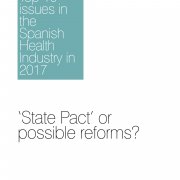Seniority or merits?

Article published in the daily “La Nueva España” (Oviedo), June 2, 2016
Seniority or merits?
These days we are witnessing in Asturias an acute controversy following the incorporation into the Asturias Central Hospital, the largest hospital in the region, of 70 doctors based only on seniority criteria.
The reason for the controversy is that service chiefs have rejected the procedure, considering that the merits and needs of the hospital should have been evaluated, while unions rallied strongly in favour, reckoning that seniority is a good approach and a way to avoid arbitrariness.
I do not intend to fall into primary anti-unionism, but rarely has the negative role that unions have been playing in the public health sector over many years, to the point of becoming a serious obstacle to the necessary reforms, been viewed so harshly. The so-called “professional” unions are no exception, but often even adopt more radical positions. I am obviously not an advocate of the disappearance of unions, but of a union practice that is not incompatible with intelligence and common sense.
But agreeing with the service chiefs does not end the debate, if we don’t consider other points.
First, the statutory regime itself, which assimilates health workers in the public sector to civil servants, hyper-protectionist towards sector professionals. The concept of “tenure” creates asymmetry in professionals / management logic, in favour of the former, which often prevents the slightest management and change implementation. Moreover, the egalitarian culture, linked to the statutory regime, reluctant towards differentiation and individual and collective recognition is also very negative. Like many hyper-protectionist regimes they turn against the interests of those who are to be protected, especially the most active and motivated professionals, giving priority to the interests of the uncommitted. Thus no reform of the public health sector can be envisaged with the statutory regime, which should be declared extinguishable and, respecting vested rights, new recruitments made via the ordinary labour regime. Only then will the concepts of regular evaluation, promotion, career and variable compensation, which are so necessary, make sense within the context of a fully-fledged personnel management policy.
Another element that is implicit in the debate is the autonomy of hospitals and health centres. This is an issue that arose in the 80s and 90s of the last century, but was forgotten about with the healthcare transfers to the regions. With them came the hegemony without limits of the regional ministries and progress towards the autonomy of health centres was shelved. But there can be no modernization of health centres if they don’t have a minimum capacity for certain organizational decisions, personnel and adapting their healthcare offer.
Finally, the issue of governance, which includes a government / management separation. The managers run the company, while the government (council members) ensures that management is correct and that it goes in the right direction. And with the board intervening in the selection, evaluation and removal of the first manager of the centre. Only thus can a fully-fledged management system be guaranteed. A step in this direction is taking place in the Basque Country and in a recent resolution of the Assembly of Madrid.
Seniority or merits? Of course, merits, but only within the context of overcoming the statutory regime, autonomy of institutions and governance that understands the distinct role of government and management.




